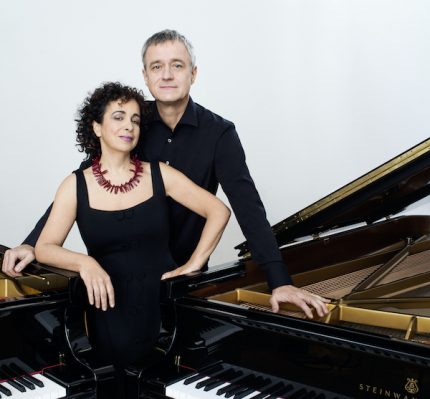A prosaic night of duo piano music at Mandel Hall

Duo-piano recitals are not plentiful even in Chicago’s varied and bustling music scene. Among today’s cost-conscious presenters, the attitude seems to be, why shell out money for two pianists when you can get one for less playing music people know better?
The University of Chicago Presents series bucked that trend by bringing Duo Tal and Grouethuysen to Mandel Hall for their Hyde Park debut Friday night.
The event was the first fruit of UC’s newly founded Wilhelm von Humboldt Performance Fund, created by an anonymous donor to underwrite concerts of German music.
As it turned out, only three of the five composers on tap Friday were German, but never mind. The program was a varied and intriguing one, with a pair of four-hand works by Mozart and Schubert and a trio of orchestral showpieces played in transcription for two pianos.
The Israeli Yaara Tal and German Andreas Groethuysen have been performing as a duo team for over three decades with 35 recordings released on the Sony label during their long partnership.
Mozart’s Sonata in B flat, K. 358 led off the evening. Written at age 18, this slender yet engaging work is likely one of the early duets Mozart wrote to play with his beloved sister Nannerl.
Yet Friday night’s performance, with Tal playing the primo part as throughout, was overloud, lacking in sensitivity and jarringly charmless. The opening Allegro was taken at a rushed tempo that felt far too fast for the music, with some errant notes along the way. With Tal’s bland approach, the Adagio was sorely lacking in poise and refinement. The Molto presto finale went better but still emerged more fast and breathless than conveying any sense of the music’s wit or playfulness.
Schubert wrote a voluminous amount of four-hand piano music, and Tal and Grouethuysen have recorded this vast oeuvre complete. Thus one expected better results with Schubert’s Fantasie in F minor, D940, a compact but fully idiomatic masterpiece in four connected movements.
Sadly, that didn’t happen. The introspective opening theme was rendered by Tal with little mystery or atmosphere. As in the Mozart, the duo’s playing was mostly clean but generalized and prosaic—impatient in tempos and narrow in expression and dynamics, hovering at a straitened mezzoforte-forte throughout. The shallow, clattery Steinway didn’t help matters.
It’s not an easy thing to make this rich, compelling score seem dull but the heavy-handed rhythms, rushed lyrical episodes and banging at climaxes made the Fantasie seem oddly uninspired and second-rate. An audience member’s bird-chirping cell phone disturbance almost came as a relief.
After intermission the focus was on transcriptions for two pianos, leading off with Wagner’s own arrangement of the Overture to his opera Tannhäuser. Subtler passages and dynamics were streamlined and there was little rapt expression to the Pilgrim’s Chorus, but Tal and Grouethuysen built the final bars up to a grand and sonorous coda.
Andre Caplet’s transcription of Debussy’s La Mer is masterful, using every possible trick and aural sleight of hand to render this elliptical impressionistic ode to the sea as an effective vehicle for two pianos. Yet here again the duo’s literal, impatient approach to the score—sloughing over shadings and expression and refusing to linger—largely failed to communicate the languor and atmosphere of the music.
The evening closed with Till Eulenspiegel’s Merry Pranks. As much as La Mer, Richard Strauss’s kaleidoscopic tone poem of the eternal trickster seems inseparable from Strauss’s souped-up canvas for huge orchestra. While inevitably losing the vast range of orchestral colors and timbres, Otto Singer’s arrangement for two pianos is resourceful and brilliant, effectively getting all of the music onto 176 keys.
The Strauss-Singer confection received the best performance of the evening with Groethuysen, especially, drawing a wider range of expression and dynamics. Still, one had the feeling there were more opportunities to be mined in this retooled Till that went unexplored, with the score’s humor and mercurial panache only fitfully evident.
The duo offered another transcription as an encore, this time Debussy’s retooling of the No. 5 Canon in B minor from Schumann’s Six Etudes in Canon Form, Op. 56.
The next UChicago Presents event will be violinist Rachel Podger 7:30 p.m. January 24 at the Logan Center. chicagopresents.uchicago.edu
Posted in Performances




